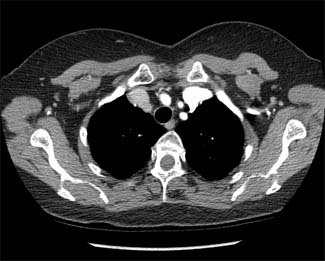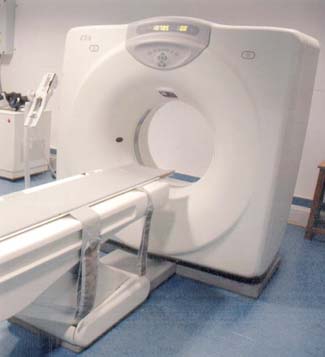Get More Information:
Minimally Invasive Diagnostic Procedures (Testing)
Radiation Therapy for Lung Cancer
Find Lung Cancer Clinical Trials
Lung Cancer Screening

Learn about our screening program
to promote early detection for those at high risk of developing lung cancer.
Listen In
The Cancer Institute’s Dr. John Langenfeld explains the benefits of lung cancer screening in this WOR radio interview. Click here to listen
 To promote early detection of lung cancer, the Lung Cancer/Thoracic Oncology Program at Rutgers Cancer Institute collaborates with Robert Wood Johnson University Hospital and University Radiology / Department of Radiology at Rutgers Robert Wood Johnson Medical School to provide a lung cancer screening program for those at high risk for developing the disease due primarily to past or current smoking habits and/or a history of chronic lung disease.
To promote early detection of lung cancer, the Lung Cancer/Thoracic Oncology Program at Rutgers Cancer Institute collaborates with Robert Wood Johnson University Hospital and University Radiology / Department of Radiology at Rutgers Robert Wood Johnson Medical School to provide a lung cancer screening program for those at high risk for developing the disease due primarily to past or current smoking habits and/or a history of chronic lung disease.
If you are a smoker or former smoker over 50 years old with 20 or more "pack years" (number of packs of cigarettes smoked per day multiplied by the number of years smoked), you should talk to your doctor about getting a Computerized Tomography (CT) screening for lung cancer.
The lung cancer screening includes a low-dose CT scan of the chest, which uses a combination of x-ray techniques and computer technology to provide highly detailed images of internal structures. The CT scanner uses an x-ray source similar to that used to obtain ordinary chest x-rays, however, the x-ray beam is so tightly focused that portions of the body outside of the scanned region get relatively little x-ray exposure. The Program is designated as an American College of Radiology Lung Cancer Screening Center.
The cost of the screening is covered by Medicare and may also be covered by other medical insurance companies.
 The CT scanner takes multiple pictures through the selected area of the body. Depending on the part of the body scanned, between 20 and 1,000 separate images will be generated. Most studies are completed within about 5 to 10 minutes. The information is processed by a computer and then made available to the radiologist for review.
The CT scanner takes multiple pictures through the selected area of the body. Depending on the part of the body scanned, between 20 and 1,000 separate images will be generated. Most studies are completed within about 5 to 10 minutes. The information is processed by a computer and then made available to the radiologist for review.
Members of the Lung Cancer/Thoracic Oncology Program participated in the National Lung Screening Trial (NLST), which showed that screening for lung cancer was more effective with a CT scan of the chest rather than with a chest x-ray. Radiologists of the Thoracic Oncology Program were participants in this nationwide study and are available to read a patient's low-dose screening chest CT if completed at one of the program's radiology offices. The results are then sent to the patient and the referring physician.
For additional information on lung cancer screening, call 844-CANCER-NJ

